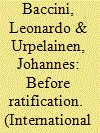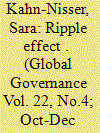| Srl | Item |
| 1 |
ID:
172314


|
|
|
|
|
| Summary/Abstract |
International treaties require ratification to go into effect. But while some treaties have high ratification rates, many do not, leading to a system where issues appear to be addressed on paper but are not in practice. This article seeks to address why treaties receive varying levels of support and finds that factors present during the negotiation phase of the agreement affect the ratification phase. Specifically, bargaining power at and away from the negotiation table influences both the substantive nature of the treaty and the extent to which it will be widely ratifiable. This article explores this issue both in a statistical analysis and in two pairs of qualitative case studies. The evidence indicates that negotiation processes cast a long shadow on the fate of international agreements leading to the current treaty system of prolific international law that is not ratified by most states.
|
|
|
|
|
|
|
|
|
|
|
|
|
|
|
|
| 2 |
ID:
130996


|
|
|
|
|
| Publication |
2014.
|
| Summary/Abstract |
When do international treaties cause domestic policy adjustments? While previous research emphasizes the consequences of treaty ratification, we argue that the need to secure entry into force can induce states to change their policies already before ratification. If a state expects benefits from a treaty, it can increase the probability of foreign ratification by implementing policies that benefit pivotal domestic players within its partner country. Accordingly, studies that focus on policy change after ratification underestimate the importance of treaties and partly misconstrue the causal connection between treaties and policies. We test the theory against data on the relationship between North-South preferential trading agreements (PTAs) and automobile emission standards, finding that developing countries adopt automobile emission standards between the signature and ratification of North-South PTAs.
|
|
|
|
|
|
|
|
|
|
|
|
|
|
|
|
| 3 |
ID:
113751


|
|
|
|
|
| Publication |
2012.
|
| Summary/Abstract |
Why do states make disingenuous treaty commitments? Under what conditions will countries refrain from entering cooperative agreements with which they do not expect to comply? This article addresses these questions by analyzing how states that are pursuing nuclear weapons treat the nuclear Nonproliferation Treaty (NPT). The authors develop a distinction between two types of noncooperative behavior. The first is cheating while part of the NPT (predation) and the second is pursuing nuclear weapons outside of the treaty (abstention). The authors' argument is that democratic proliferators are more likely to abstain because executives in democracies are domestically constrained to a greater degree than authoritarian leaders. Statistical tests in a sample of all countries with active nuclear weapons programs from 1968 to 2004 provide evidence in favor of our argument. Controlling for confounding variables and the factors that motivate states to pursue nuclear weapons, the results show that states with greater constraints on executive authority are less likely to choose predation. Yet, electoral mandates do not appear to dissuade governments from making disingenuous treaty commitments. These findings have important implications for nuclear proliferation, the credibility of international commitments, and efforts to link domestic political institutions with international outcomes.
|
|
|
|
|
|
|
|
|
|
|
|
|
|
|
|
| 4 |
ID:
149066


|
|
|